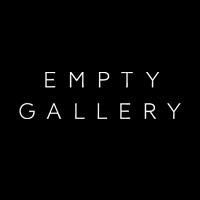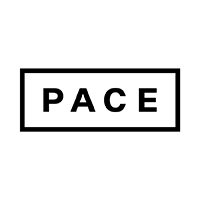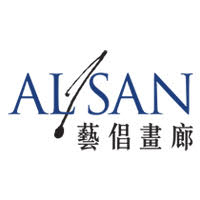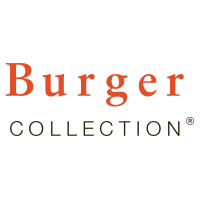Wong Ka Ying’s “Plastic Love”
By Issac Jinghui Li
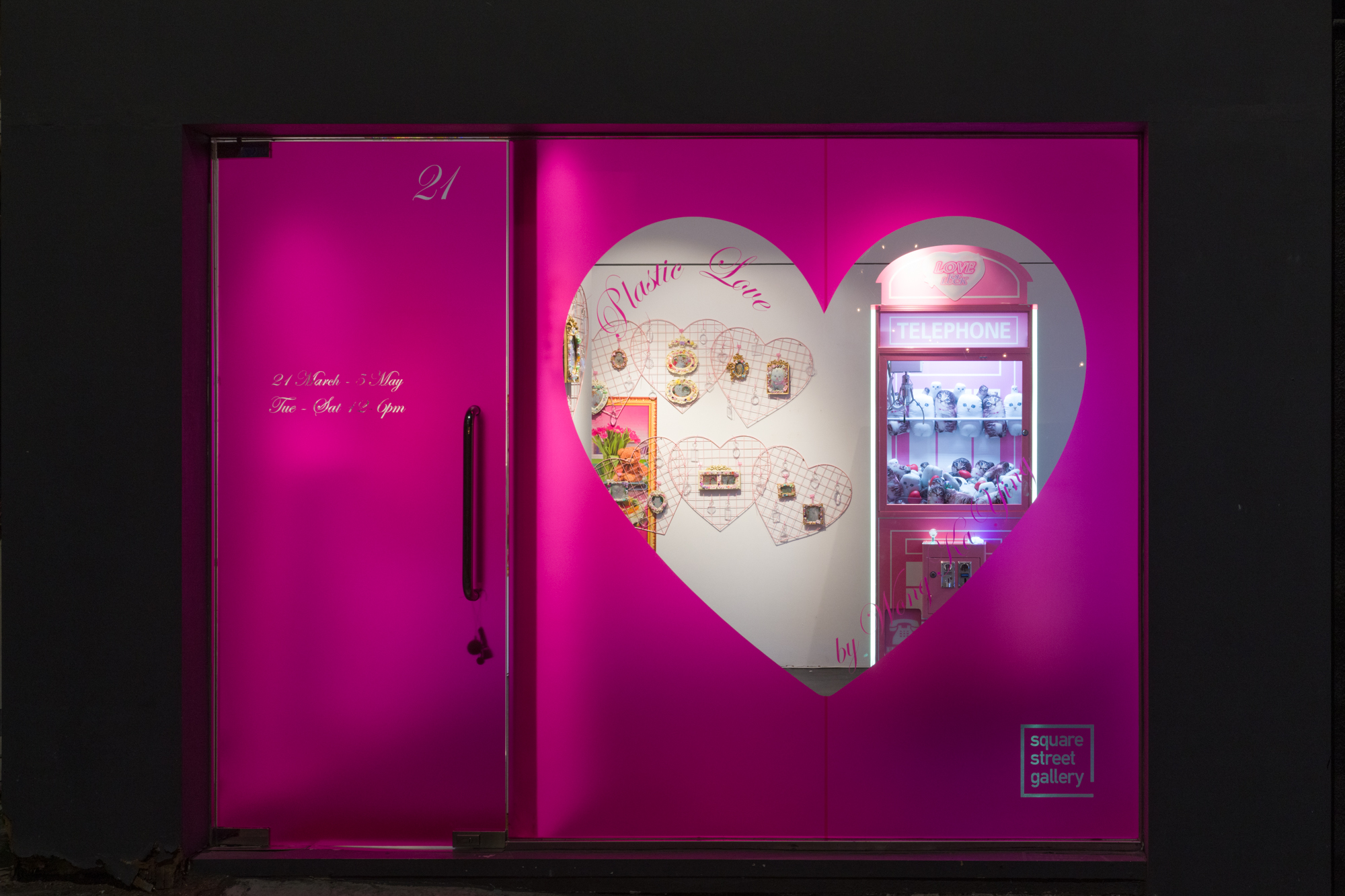
Exterior of WONG KA YING’s solo exhibition "Plastic Love" at Square Street Gallery, Hong Kong, 2024. Photo by Felix SC Wong. Courtesy Square Street Gallery
Mar 21–May 5
Wong Ka Ying: Plastic Love
Square Street Gallery
Hong Kong
Hong Kong artist Wong Ka Ying’s first exhibition with Square Street Gallery, “Plastic Love,” showcased her unique and playful artistic practice in an alternative gallery space. The exhibition title highlights the artificiality of Wong’s signature plastic works, which serve as a tangible representation of society’s obsession with commodity and kitsch.
Curators transformed the glass-fronted Sheung Wan gallery into an intimate and narrative arcade. Pink film on the glass door and window contoured a transparent heart shape, like peeping into Wong’s inner world and fantasies. For passersby, the heart also frames Wong’s modified claw machine, Love for Luck (2024), located at the center of the gallery. Surrounding the machine were photoshopped kitten posters, dazzling glitter, artificial gems, and trinkets, and this excess of material and imagery evoked a girly, yet hoarder-like ambiance. Spatially, Wong was inspired by Jumpin’ Gym, an entertainment center and arcade chain that embodies the enticing yet empty emotions associated with overconsumption.
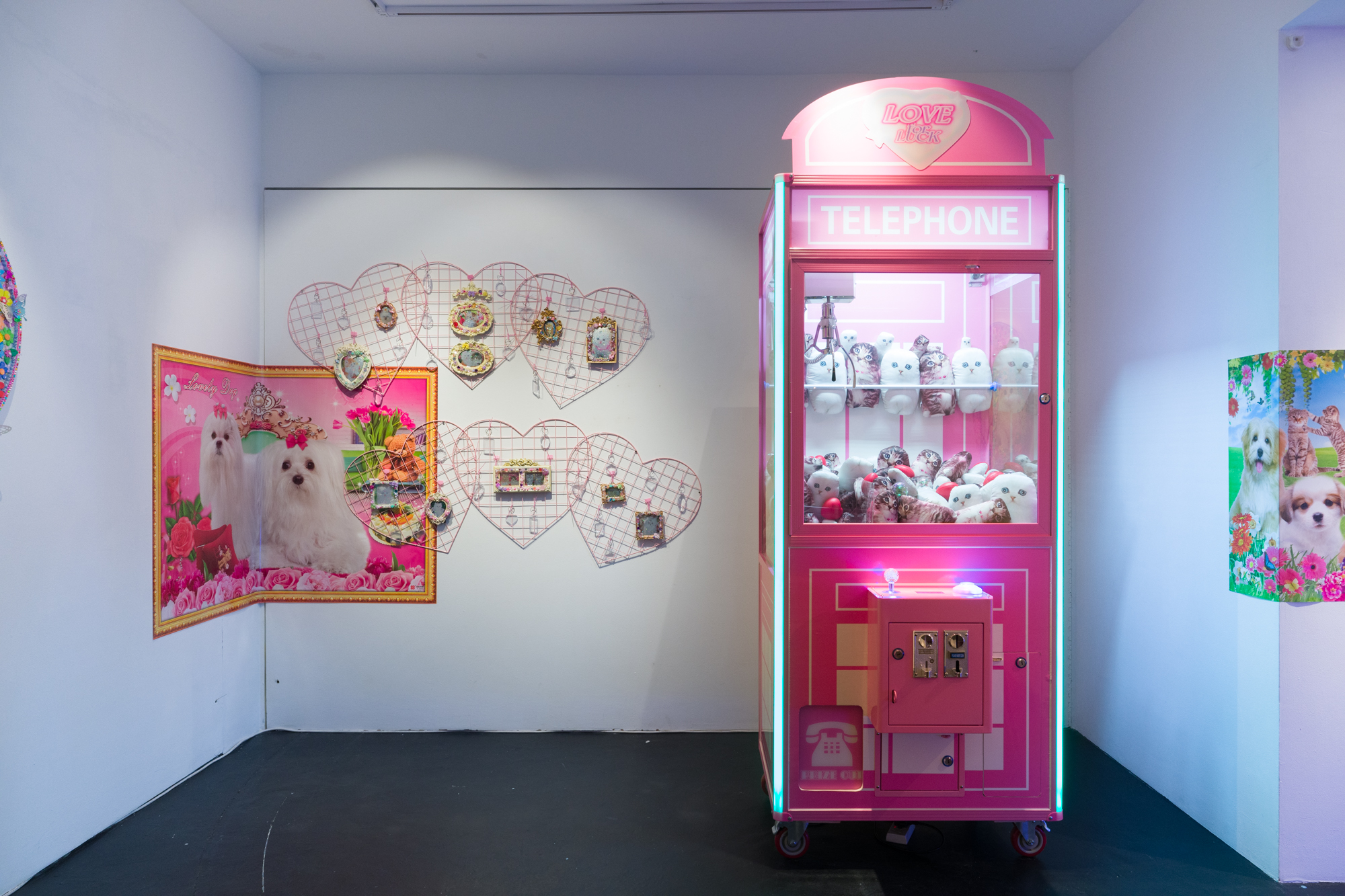
Installation view of WONG KA YING’s Love for Luck, 2024, custom cat plushies, sound, color print on acrylic, 90 × 90 × 190 cm. Photo by Felix SC Wong. Courtesy the artist and Square Street Gallery.
Visitors were encouraged to physically engage with Love for Luck, which offered the chance to win plastic plush toys of kittens for a mere five Hong Kong dollars. The game-artwork draws attention to consumerism as crowds gathered to play it, simulating society’s incessant low-cost desires. Here, one’s whims could either inflate boundlessly from instant gratification or plummet to the depths as audiences watch on. The affective fluctuation was also contagious: amplified by an overstimulating gallery space that emphasizes material temptation, visitors were simultaneously animated to connect with and perform for others by playing the game and flaunting their rewards.
A similar sensation was garnered from viewing Wong’s resin- and glitter-covered canvas works of cutesy puppy and kitten posters in different shapes, such as Pretty, Be in Love, and Sweet Moment (all 2024). The subjects recall the infinite pet stores across Hong Kong (particularly in the Causeway Bay district), in which purebred animals are trapped inside tiny glass and plastic cages, perpetually ogled at by passersby. Wong’s materials, including gems and plastic trinkets bedazzled on the canvas’ surface, concretize that association. Within the artworks, fluffy, miniature cats and dogs under the cocktail of resin and glitters become sad and hollow objects of immediate desire, as opposed to living, breathing beings. Gazing emptily at the audience, images of the extortionately priced pets interrogate the craze behind an economy of “cuteness,” by which factual cruelty is obscured and masqueraded as love.

Insallation view of WONG KA YING’s solo exhibition "Plastic Love" at Square Street Gallery, Hong Kong, 2024. Photo by Felix SC Wong. Courtesy Square Street Gallery
Wong’s series of mixed-media paintings Pussy Angels (2024), featuring photographs of eyeless cats glazed in baroque frames, further highlights society’s obsession with possessing status symbols. While latticed metal in heart shapes evokes crates in purebred pet stores, Wong’s signature glossy veneer (a resinous concoction) bring to mind the kind of “filters” associated with social media. These deceptive facades symbolize the parasocial fixation with perfection, as influencers devote enormous amounts of time to polishing and manipulating images—of everything from pets to food—in attempts to present glamorous lifestyles. The manipulation of reality throughout “Plastic Love” highlights this vapid infatuation, while the works’ excessive artificiality emphasizes our surplus consumption.
Wong returns to the arcade theme in Bonus Spin (2024), a coin pusher machine-like work. Here, Wong interrogates the game’s endless pushing motion, as Bonus Spin’s mechanical repetition mirrors the act of inserting coins again and again while desiring maximum reward. She then satirizes the game as feeble in the sculptural installation Crystal Magic (2024), in which artificial gems won by strangers are modified into lotus lamps (a common object in domestic Buddhist offerings) and displayed as a faux shrine, as if inviting visitors to worship the myth of fulfillment presented by capitalism. Wong warns us: from luxury pets and plastic toys to artificial crystal, commodified desires are never satisfied before being replaced by the next one.

Installation view of WONG KA YING’s Magic Crystal 1-6, 2024, plastic crystals and gems, lotus light, dimensions variable. Photo by Felix SC Wong. Courtesy the artist and Square Street Gallery.
Throughout “Plastic Love,” the artist calls into question complex social issues and changes by aesthetically mirroring capitalist surplus. Purebred cats on mass-produced generic posters reveal the limitless cruelty in pursuing (and oftentimes abandoning) perfect pets, and toys from claw machines eventually become unplaceable waste, adding plastic to already past-capacity landfills. While immediately girly and playful, upon closer examination, Wong’s maximalist artworks criticize society’s endless consumption, indulgence, and—perhaps worst of all—disregard for the consequences of this superficiality.



